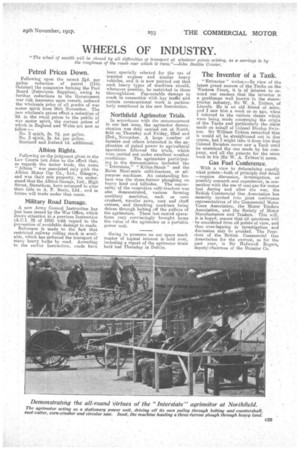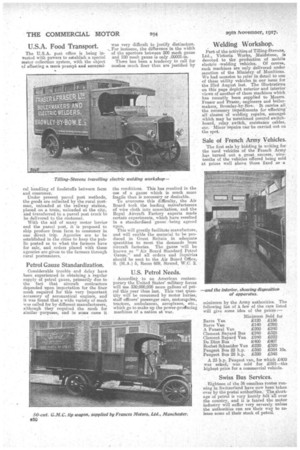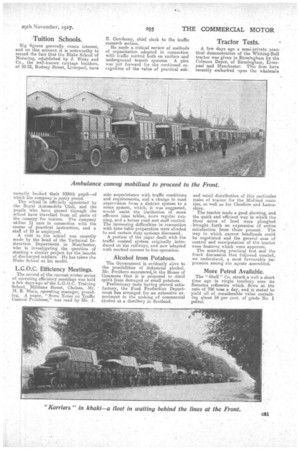WHEELS OF INDUSTRY.
Page 5

Page 6

Page 7

If you've noticed an error in this article please click here to report it so we can fix it.
"The wheel of wealth will be slowed by all difficulties oftransport at whatever points arising, as a carriage is by the roughness of the roads over which it runs."—John Beattie Crozier,
Petrol Prices Down.
Following upon the recent 24c1. per
gallon reduction of petrol • (11th• October) the companies forming the Pool Board (Petroleum Supplies), owing to further reductions in the Government war risk insurance upon vessels, reduced the wholesale price of all grades of war n,otor spirit from 26th November. The new wholesale prices effect a reduction of .2d. in. the retail prices to the public Of war motor spirit, the current prices of which in England and Wales are now as follow :—
No. 2 spirit, 3s. 7d. per gallon. No. 3 spirit, 3s. 6d. per gallon. Scotland and Ireland id. additional. •
Albion Rights.
Following on the judgment given in the Law Courts last June to the effect that, as regards the motor trade, the name " Albion " was associated only yith the Albion Motor Car Co., Ltd., Glasgow, and was their sole property, we understand that the Albion Garage, Ltd., High Street, Streatham, have arranged to alter their title to A. P. Beale, Ltd., and in future will trade under that name.
Military Road Damage.
A new Army Council Instruction has just been issued by the War Office, which draws attention to a previous Instruction (ACT. 22 of 1916) with regard to the prevention of avoidable damage to roads. Reference is made to the fact that restricted railway rolling stock is available, which has enforced the transport of many heavy bulks by road. According to the earlier Instruction, roads have been specially selected for the use of traction engines and similar heavy vehicles, and it is now pointed out that such heavy types of machines should, whenever possible, be restricted to theso thoroughfares. Preventable damage to roads in connection With hay traffic and certain constructional work is particularly mentioned in the new Instruction.
Northfield Agrimotor Trials.
In accordance with the announcement in our last issue, the agrirnotor demonstration was duJy carried out at Northfield on Thursday and Friday, 22nd and 23rd )„ November. A large number of farmers and others interested in the application of petrol power to agricultural operations followed the trials, whieh were carried out under excellent weather
conditions. The agrimotors participating in the demonstration included the " Interstate," " Killen-Strait " and the Bales Steel-mule eulti-tractors, or allpurpose machines. An outstanding feature-was the three-furrow ploughing on heavy land and hillsides. The universality of the respective culti-tractors was also demonstrated, various farming auxiliary machines, such as corn crusher, circular saws, root and chaff cutters, and threshing machines being driven through belting off the pulleys of the agrimothrs. These last-named operations very convincingly brought home the value of the agrimotor as a portable power unit.
Owing to pressure on our space much matter of topical interest is,held over, including a report of the agrinnotor trials held last Thursday in Dublin.
The Inventor of a Tank.
"Extractor" writes:—In view of the latest grand success of the Tanks on the Western Front, it is of interest to remind our readers that the inventor is a gentleman well known in the steamtractor industry, Sir W. A. Tritton, of Lincoln. He is an old friend of mine, and I saw him a week or so ago, when I referred to the various claims which were being made concerning the origin of the Tanks and particularly the claim made on behalf of Colonel Dunlop Swinton. Sir William Tritton remarked that it would all be straightened out in due course, but I might take it from him that Colonel Swinton never saw a Tank until he examined the one made by his company, and all the patents for the same were in his (Sir W. A. Tritton's) name.
Gas Fuel Conference.
With a view to determining exactly what points—both of principle and detail —require discussion, investigation, or possibly research and experiment, in connection with the use of coal-gas for motor fuel during and after the war, the British Commercial Gas Association has recently invited into joint conference representatives of the Commercial Motor Users Association, the 'Motor Traders Association, and the Society of Motor Manufacturers and Traders. This will, it is hoped, ensure that all questions will be considered from all points of view, and that over-lapping in investigation and discussion v be avoided. The Presi dent of the British Commercial Gas Association for the em-rent, as for the past year, is Sir Hallewell Rogers, deputy-chairman of the Daimler Co.
U.S.A. Food Transport.
The U.S.A. post office is being invested with powers to establish a special motor collection system, with the object of effeeting a more prempt and etoaorai
cal handling of foodstuffs between farm and consumer.
Under present parcel post methods, the goods are collected by the rural postman, unloaded at the railway station, placed on a train, unloaded at the city, and transferred to a parcel post truck to be delivered to the customer.
With the aid of many motor lorriee and the parcel post, it is proposed to ship producefrom farm to consumer in one direct trip. Agencies are to be established in the cities to keep the public posted as to what the farmers have for sale, and orders placed with these agencies arc given to the farmers through rural postmasters.
Petrol Gauze Standardization.
Considerable trouble and delay have been experienced in obtaining a regular supply of petrol gauze, primarily due to the fact that aircraft contractors depended upon importation for the finer mesh required for this very important accessory of aeronautical engines, and it was found that a wide variety of mesh was called for by different manufacturers, although they required the mesh for similar purposes, and in some cases it was very difficult to justify distinction. For instance, the difference in the width of the aperture between 200 mesh gauze and 180 mesh gauze is only .00001-in. There has been a tendency to call for meehes much finer than are justified by the conditions. This has resulted in the use of a gauze which is much more fragile than is necessary or desirable. To overcome this difficulty, the Air Board took the leading manufacturers of wire cloth into consultation, and the Royal Aircraft Factory experts made certain experiments, which have resulted in a standardized gauze" being agreed upon. This will greatly facilitate manufacture, and will enable the material to be produced in Great Britain in adequate quantities to meet the demands from aircraft factories. The gauze will he known as " Air Board Standard Petrol Gauze," and all orders and inquiries should be sent to the Air Board Office, S. {M.A.) 6, Room 609, Strand, W.C. 2.
U.S. Petrol Needs.
According to an American contemporary the United States' military forces will use 330,000,000 more gallons of petrol this year than last. This vast quantity will be consumed by motor lorries, staff officers' passenger cars, motorcycles, tractors, ambulances, aeroplanes, etc., which go to make up the power-producing machines of a nation at war.
Welding Workshop.
Part of the actiyitiesof Tilling-Stevens, Ltd. Victoria Works, •Maidstone, is devoted, to the production of mobile electric -welding vehicles. Of course, such machines are only delivered under sanction of the Ministry of Munitions.
We i had occasion to refer n detail to one of these utility vehicles in our issue for the 23rd August last. The illustrations on this page depict exterior and interior views of another of these machines which has recently been supplied to' Messrs. Fraser and Fraser, engineers and boilermakers, Bromley-by-Bow. It carries all the necessary impedimenta for effecting' all classes of welding repairs, amongst Which may be mentioned control switchboard, relay switch, resistance cables, etc. Minor repairs can-be carried out on the spot. .
Sale of French Army Vehicles.
The first sale by bidding in writing for the used vehicles of the French Army has turned out a great success,ninetenths of the vehicles offered being sold at prices well above those fixed as a minimum by the Army authorities. The following list of a few of the cars listed will give some idea of the prices :— Minimum Sold for Barre Van 2120 2150 Barre Van £140 2200 A Funeral Van £200 £240 Clement Bayard Bus £240 £328 Clement Bayard Van £240 £282 De Dion Bus ' 2400 £407 Rochet Schneider Van £220 eszo Peugeot Bus 22 h.p. £380 £384 10s. Peugeot Bas 28 h.p. £320 2348
A 25 h.p. Peugeot van, for which £400 was asked; was sold for 2581—the highest price for a commercial vehicle.
Swiss Bus Services.
Eighteen of the 36 omnibus routes running in Switzerland have now been taken Over by the postal authorities. The shortage of petrol is very keenly felt all over i the country, and it s feared the motor industry will suffer very severely unless the authorities can see their way to release some of their stock of petrol.
-Tuition Schools.
Big figures generally create interest, and on this account it is noteworthy to record the fact that the Blake School of Motoring, established by J. Blake and Co., the well-known carriage builders, of 2022,Rodney Street, Liverpool, have recently booked their 1000th pupil—of which the company is justly proud. • The school 'is officially appointed by the Royal Automobile Club, and the pupils who have plassed through the school have travelled from all parts of the country for tuition. The company utilize 11 cars in connection with the course of practical instruction, and a staff of 10 is employed. A visit to the school was recently made by the head of the Technical Instruction 'Department . in Manchester, who is investigating the question, of starting a similar project for the benefit of. discharged soldiers: He has taken the Blake School as his model.
L.G.O.C. Efficiency Meetings.
The second of the current winter series of operating efficiency meetings was held a few days ego at' the L.G.O.C. Training School, Milmans Street, Chelsea, Mr. • H. E. Blain, operating manager, presiding. A paper, "Some Notes on Traffic Control Problems," ikas read by Mr. J.
E. Cowderoy, chief clerk to the traffic research section.
He made a critical review of methods of organization adopted in connection with traffic control both on surface and underground transit systems. A plea was put forward for the continued recognition of the value of practical out side acquaintance with traffic conditions and requirements, and a change in road supervision from a district system to a route system, which, it was suggested, would assist the institution of more efficient time tables, more regular running, and a better road and staff control. The increasing difficulties in connection with time table preparation were alluded to and certain duty systems discussed. A portion of the paper dealt with the traffic control system originally introduced on the railways, and now adapted with marked success to bus operation.
Alcohol from Potatoes.
The Government is evidently alive to the possibilities of industrial alcohol. Mr. Prothero announced,in the Rouse of Commons that it is proposed to distil spirit from damaged or small potatoes.
Preliminary tests having proved satisfactory, the Food Production Department has arranged for an extensive experiment in the making of commercial alcohol at a distillery in Scotland.
Tractor Tests.
A few days ago a semi-private practical demonstration of the Whiting-Bull tractor was given in Birmingham by the Colmore Depot, of Birmingham, Liverpool and Manchester. This firm have recently embarked spun the wh.elesalo and retail distribution of this particular make of tractor for the Midland counties, as well as for Cheshire and Lancashire.
The tractor made a good showing, and the quick and efficient way in which the three acres of land were ploughed brought forth an expression of entire satisfaction from those present. The way in which narrow headlands could las negotiated and the general ease of control and manipulation of the tractor were 'features which were apparent. The searching practical test and the frank discussion that followed created, we understand, a most favourable impression among the agents assembled.
More Petrol Available.
The " Shell " Co. struck a well a short time ago in virgin territory near its Sumatra refineries which flows at the rate of 750 tone a day, and is stated to yield oil of considerable value containing about 54 per cent, of grade No. 1 petrol.
























